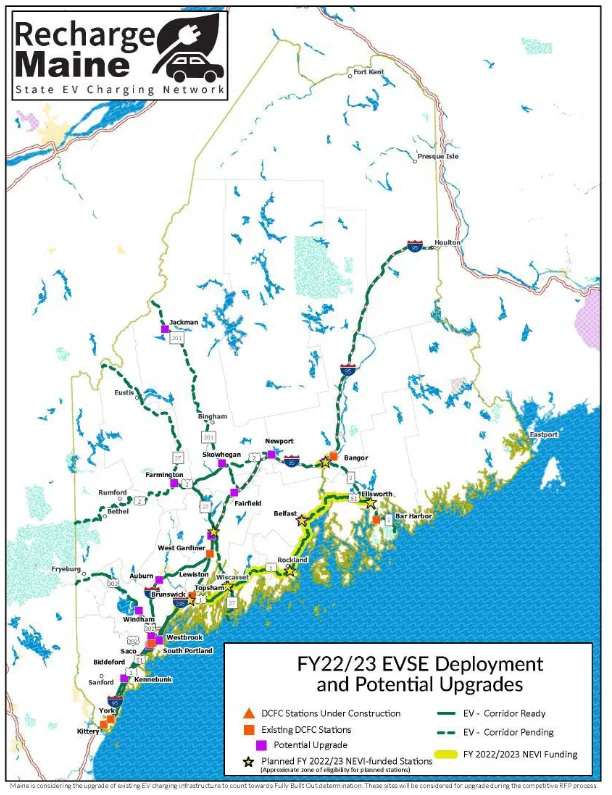The Maine Department of Transportation has released an updated Plan for deploying electric vehicle charging infrastructure around the state using funds from the National Electric Vehicle Infrastructure Program (NEVI). The NEVI program provides dedicated formula funding to states to strategically expand the EV charging network along designated alternative fuel corridors.
NEVI formula funding will enable Maine to continue expanding EV charging infrastructure. Maine expects by 2024 to have operational DCFC stations, generally no more than 50 miles apart, for the entire length of Maine’s interstate and then continue for the rest of Maine’s AFCs. MaineDOT has set aside matching funds to cover 20% of local match requirements for NEVI-funded projects in parts of the state that may require additional funding to attract private investment. Match requirements may be different for each RFP/project. Maine will make efficient use of federal funding, such that at least 20% of costs will come from state or private funds. Maine has noted that NEVI dollars are available until expended and will be monitoring both EV adoption and usage of charging infrastructure. Plans will be adjusted accordingly, which will prevent getting ahead of demand (for charging infrastructure) in some locations while falling behind demand in other locations.
In addition to the NEVI formula funds, Maine has an estimated $1M in NECEC funds and $8M in ARPA funds, and has applied for over $15M in discretionary CFI grant funds. Maine will ensure that each competitive solicitation and funding opportunity that is issued fits with the goals and limitations of its funding source and will continue to pursue other charging infrastructure funding sources actively. These non-NEVI funds will be used for targeted DCFC installations near MUD, rural areas, for lower power charging sites (i.e., L2), for other priority corridors and destinations that are not on AFCs. Maine recently issued competitive solicitations for other priority corridors in Aroostook County (northern Maine) and Washington County (eastern Maine) and for a connection between the two corridors (US Route 1 Calais to Houlton), which will connect two large Tribal communities. Other corridors to be addressed in the future include Route 16 through Piscataquis County.
Maine has studied eight destination towns, three of which are not on AFCs: Millinocket, Greenville, and Rangeley. It will be important for Maine’s tourism-dependent towns to have DCFC available in these destinations, in addition to L2 installations at lodging and other locations. Maine will participate in discussions about EV travel to and from Canada and neighboring states with high rates of EV adoption to ensure that the alternative fuel corridors designated in Maine will be spaced no more than 50 miles from the next EV charger in the neighboring state or province.

Maine sees widespread adoption of electric vehicles as critical to meeting its climate and clean transportation goals. Transportation currently accounts for nearly half of all greenhouse gas emissions in the state. Through extensive stakeholder engagement and coordination with agencies like Efficiency Maine, the updated Plan aims to support EV adoption across all communities in Maine.
A key focus is addressing “range anxiety” that deters some from buying EVs, especially in rural areas. The Plan sets a target of installing DC fast chargers every 50 miles or so along major travel routes. This will enable drivers to charge quickly and continue long trips throughout the state with confidence. Chargers will meet the 150kW standard required under NEVI to future-proof the network.
While NEVI funds cannot fully cover charging infrastructure needs on their own, the Program lays an important foundation. Maine will leverage these formula dollars strategically as seed funding to attract additional state, federal and private investment. Partners like Efficiency Maine will work to site new stations equitably, considering the needs of disadvantaged communities and regions underserved by existing charging options.
Full buildout of the network at NEVI standards comes with higher costs than Maine initially projected. The updated Plan revises previous phased approaches in line with new federal regulations. Stakeholders praise Maine’s commitment to a convenient, reliable statewide charging system with standards that can support electric mobility far into the future.